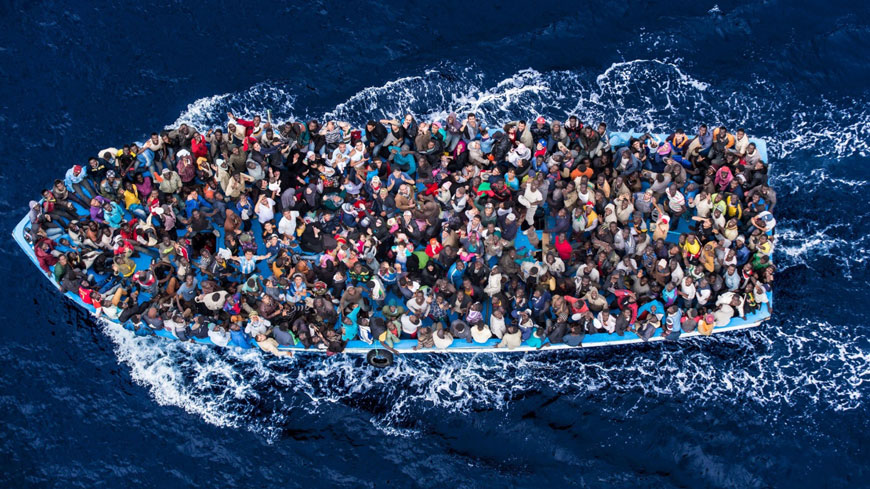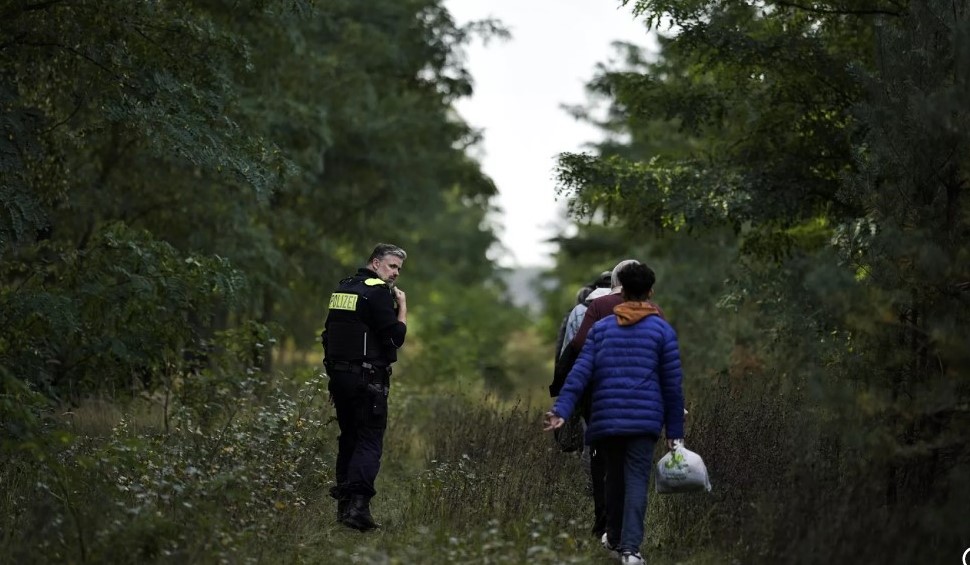In the backdrop of Europe’s urgent efforts to counter Russia’s threats, it’s evident that the continent grapples with other profound challenges, notably the immigration crisis. The European Union is increasingly compelled to focus its attention and resources on the escalating influx of migrants and asylum seekers.
As the European Parliament elections approach, political entities have delineated their perspectives on this pivotal issue. Candidates are campaigning on a new pact concerning migration and housing, advocating for a comprehensive reform that proposes unified rules for accepting and resetting asylum seekers within EU member states. After years of contentious debate, this reform has been endorsed by the European Parliament.
Prioritizing the benefits of this reform is essential as the EU continues to wrestle with the migration crisis. In 2023, asylum applications surged to 1.14 million, marking a seven-year peak.

In a dialogue with “Fortuna,” Kakha Gogolashvili, director of the European Studies Center, elucidated the multifaceted nature of the migration issue: “The migration difficulty is twofold. On one flank, it represents a moral challenge, as the EU cannot simply refuse or severely restrict migrants from developing nations beleaguered by warfare, human rights violations, and even threats to life. This is fundamentally an ethical issue because the EU is predicated on humanitarian and ethical values.”
“Conversely,” Gogolashvili continued, “there is an inherent element of threat and defense in any entity, including the EU, which seeks to balance these individuals’ acceptance, sustenance, medical care, education, and resettlement. Nevertheless, this process cannot be indefinite and unregulated without compromising the unity and values of the EU. Migrants, especially from regions lacking a tradition of democracy and human rights, may not integrate seamlessly into the normative frameworks of European states. An excessive influx could potentially destabilize society.”
The EU’s migration policy, while stringent, reveals divisions. Certain Eastern European nations advocate for curbing migration, whereas the broader EU framework supports the distribution of migrant flows.
The EU has endeavored to manage this delicate balance and has achieved some measure of success; however, the repercussions are palpable, impacting economic stability and fueling anti-migration sentiments. Notably, the UK has altogether exited this arrangement.
In another vein, the demographic constraints in the EU necessitate the integration of migrants. Studies indicate that to sustain economic growth, the EU requires labor resources—and in significant quantities. If the EU were to seal its borders, the demand for human resources would escalate. It is a recognized paradox that more advanced civilizations exhibit lower demographic growth rates.
Several nations are implementing initiatives to support so-called ‘circular migration.’ These arrangements facilitate negotiations to manage migration processes with countries that maintain amicable relations. Migrants can enter, work, and return home as job demands fluctuate. Such arrangements include provisions for readmission; however, upon return, these workers are employed locally.
Indeed, while the EU faces substantial migration challenges, it concurrently contends with extreme policies and divergent views on managing these processes.
As parties vie for positions in the European Parliament, their manifestos reflect a broad spectrum of ideologies and proposals concerning migration. Here is what each party promises in its manifesto:
European People’s Party (EPP):
“Our guiding principles for immigration policy are humanity and order. We strive to halt uncontrolled migration,” states the manifesto of the largest faction in the European Parliament. Projections suggest that the centrist party will remain the predominant faction following the elections.
The EPP advocates for reinforced EU borders, stringent checks on those entering illegally, and comprehensive electronic monitoring at all entry points.” Internal border controls may also be reinstated if current measures prove insufficient.
Moreover, the EPP proposes augmenting the budget for the border and coast guard agency and introduces an initiative to redirect asylum seekers to “safe” countries outside the EU, where they will await the resolution of their cases—a strategy reminiscent of the British plan to deport illegal migrants to Rwanda for asylum applications.

Socialists:
The Party of European Socialists articulates its migration strategy succinctly, aiming for a new pact that is “fair, safe, and predictable,” with an unwavering respect for human rights and dignity. This entails “humane and dignified” reception conditions, legal assistance, special protection for children, and a robust effort to combat human trafficking.
Liberals:
Known collectively as Renew Europe, this faction criticizes populists for inciting racial tensions. The liberals champion a rigorous battle against smugglers and advocate for “clarity and consistency” in migration policies. They propose enhancing legal protections for new arrivals and expanding opportunities for people in their home countries, emphasizing the necessity to establish legal, economic pathways for migration.
Greens:
“The right to asylum is non-negotiable,” declares the Greens. They call for establishing a “mandatory resettlement mechanism” to ensure all 27 EU countries share responsibility for migrants. The Greens also advocate for the introduction of “climate visas” for those affected by natural disasters and highlight the need for specific provisions for LGBTQ+ asylum seekers. In their forceful statements, the Greens condemn “dirty deals with dictators,” referencing agreements with Tunisia and Egypt. “We cannot accept that refugees and migrants are exploited for geopolitical purposes. People must not be used as weapons in hybrid warfare,” they assert.

European Conservatives and Reformists (ECR):
The most radical views on migration emanate from the right-wing European Conservatives and Reformists. Including parties such as “Brothers of Italy,” “Law and Justice” (Poland), “Vox” (Spain), and “New Flemish Alliance” (Belgium), the ECR’s manifesto emphatically states that EU member states should not be compelled to accept illegal immigrants.
This stance opposes the “mandatory solidarity” system proposed in the new pact. The ECR advocates for tighter controls at all potential entry points into the EU, enhanced border infrastructure, and the adoption of new measures to combat illegal human trafficking.
They also support externalization cooperation with third countries. “Our goal is for most applications to be processed outside the EU’s borders,” they proclaim.
Left Wing Perspective:
This faction advocates for “ending the fortress Europe,” rejects externalization based on “funding bloody regimes,” and demands “mandatory solidarity” among all member states. “If the EU aims to reduce the influx of refugees and migrants, it is imperative to promote peace, stability, and sustainable development in the Middle East, Africa, and South Asia, rather than engaging in military interventions, fueling civil wars, and exploiting natural resources,” the Left’s manifesto declares.
Identity and Democracy:
The far-right group ID, which includes “Alternative for Germany” (Germany), “National Rally” (France), and “League” (Italy), has not yet published a joint manifesto. In a 2022 declaration, they stated, “The EU increasingly blurs Europe’s borders and uses them to manage migration flows, whereas borders should protect European citizens.”
Prepared based on Euronews; Photo: coe.int, ankasam

